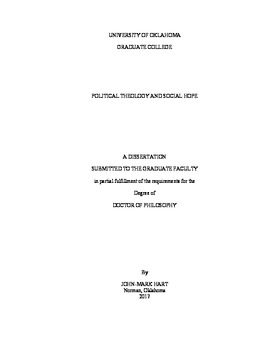| dc.description.abstract | This dissertation intervenes in political theology to offer a constructive and wide-ranging theological proposal for Christian cultural engagement and peacemaking in the context of the globalization, perpetual violence, widespread economic inequity, and religious pluralism that characterize geopolitics in the twenty-first century. Drawing upon the biblical concept of shalom, it argues that the church’s peacemaking vocation involves not only mediating conflict, but also pursuing human flourishing at the local, national, and international levels. The dissertation engages with influential classic and contemporary texts of Christian theology as well as the work of leading secular cultural theorists in order to reassess the meaning of three major concepts—evil, justice, and love—that are central for any coherent vision of Christian political praxis. Building upon this analysis, it advocates for the spiritual disciplines of lament and “prophetic imagination,” whereby the church learns to name the world’s evils while also cultivating new visions of human flourishing that can guide and sustain social action. In order to flesh out the principles and tactics of the church’s peacemaking mission, the dissertation also analyzes the thought and action of exemplary modern peace activists, notably Martin Luther King Jr., John M. Perkins, Desmond Tutu, and Dietrich Bonhoeffer. The central argument is that the church is called to resist evil and cultivate shalom in the present world order through counter-cultural love, which is expressed by (1) radical practices of reconciliation across demographic barriers, (2) assets-based development strategies aimed at promoting comprehensive flourishing in under-resourced communities, and (3) nonviolent direct action that challenges injustice at the structural level while promoting a biblically-rooted vision of human solidarity.
Keywords: political theology, peacemaking, lament, prophetic imagination, assets-based community development, nonviolent resistance, evil, justice, love | en_US |
